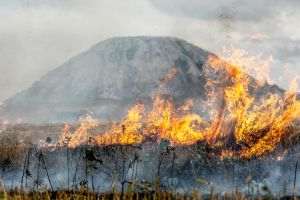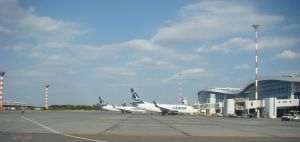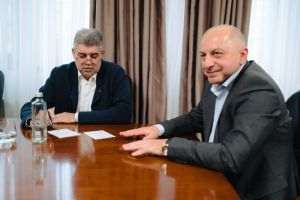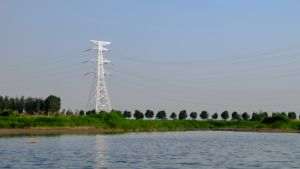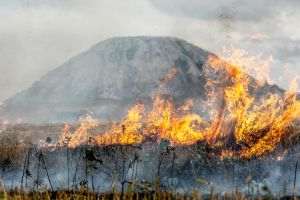The Government would adopt today several projects of normative acts transposing solutions agreed between the transporters and the Ministry of Transport to approve the most important claims of the transporters, according to a press release issued by the Executive yesterday, after the meeting with Prime Minister Marcel Ciolacu and the minister Sorin Grindeanu had it with the representatives of the transport employers.
According to the quoted source, the head of the Government declared:
"The government is a fair dialogue partner. At the level of the ministries and public institutions, we have taken over and analyzed the transporters' requests, and tomorrow, in the Government meeting, we will already approve a set of the measures agreed with both the Ministry of Transport and the Ministry of Agriculture. We will continue to remain at the table of discussions to resolve all legitimate issues raised".
The normative acts to be presented at today's meeting of the Government consider the following aspects:
- Changes regarding the methods of carrying out the control by weighing at the border crossing points. The results of weighing measurements obtained with the help of measuring instruments belonging to the competent authorities of the Member States of the European Union with which Romania has open border crossing points are recognized, based on the bilateral agreements concluded between the parties, both for issuing special transport authorizations and for the application of contraventional sanctions;
- Establishing limits, in accordance with European legislation and from other EU member states, regarding tolerances for exceeding the weight of trucks;
- Intervals for exceeding the maximum total permissible mass are granted on axles until which contraventional sanctions are not applied and authorization for the movement of these vehicles is not required;
- Clarifying some aspects regarding the performance of the periodic technical inspection of vehicles registered or registered in Romania, the professional attestation of specialized personnel in the field of road transport, as well as the correlation of some provisions regarding the conclusion and execution of the transport contract for national transports;
- Some provisions regulating the examination of persons intending to obtain the initial attestation for drivers transporting people or transporting goods are also clarified.
In addition, at yesterday's meeting, the settlement of student transport was also discussed, and the dialogue on this topic will be continued to find a solution. Another subject left under analysis refers to the partial refund of fuel excise to transport operators.
Vasile Ştefănescu, the president of the Confederation of Authorized Operators and Transporters from Romania (COTAR), told the BURSA newspaper: "I conveyed to Mr. Prime Minister Marcel Ciolacu what was agreed the day before with the Minister of Transport and it remains that in these days we will see transposed into normative acts - two emergency ordinances and several government decisions - the solutions for most of our demands, among which are the reimbursement of excise duty related to diesel fuel, new crossing points dedicated to the transport of goods to streamline the traffic from our country to the states non-EU, reducing waiting times at EU and non-EU borders, eliminating "piracy" from road transport and amending legislation on alternative transport. For the other problems, including student transport, working groups will be set up to find the best solutions. I also informed Prime Minister Marcel Ciolacu about what is happening in the RCA market and what we expect from the new management team of ASF".
Regarding the reimbursement of the excise duty on diesel, Radu Dinescu, general secretary of the National Union of Road Transporters of Romania (UNTRR) said after the meeting with the head of the Government: "It remained in the work of Mr. Deputy Prime Minister Marian Neacşu; it remained that he was going to invite us to a concrete discussion on the establishment of these amounts. Conceptually, it is 50% of the value of the increase from January 1 of the excise tax and thereafter to maintain proportionality to the increase in July. It should be known that there are reimbursement mechanisms, the Ministry of Transport has all the equipment and there is a provision in the Fiscal Code that allows this. Reinstating this concept would not be a problem. And when we proposed from January 1 a few years ago, the procedure started in April, May and applied from July. It would be good to be initiated and validated".
The representatives of the carriers has meeting last night also with the Minister of Finance, Marcel Boloş, with whom they discussed the need for the RO e-Transport system to apply only to goods with a high fiscal risk and not to all goods imported into our country. At the same time, the carriers asked the Minister of Finance that the per diem granted to drivers for accommodation and meals be at the level of that granted in the budget sector and not be taxed.
However, the farmers and transporters in the street stated that they will continue the protest until the first normative acts are published in the Official Gazette. Due to the protests, several customs points on the border with Ukraine are blocked, only in the Siret area the column of guns towards Ukraine numbering over 1100 vehicles stretched for 20 kilometers yesterday.
• Farmers' problems, discussed in the plenary session of the European Parliament
Members of the European Parliament debated in yesterday's plenary session the issues raised by farmers during the protests of the last few days across Europe. MEPs asked the European Commission to find additional financial sources for farmers and to modify the common agricultural policy.
The European Commissioner for Agriculture, Janusz Wojciechowski, said that the main problem for farmers is Russia and its war of aggression against Ukraine and its effects. Janusz Wojciechowski stated that farmers received aid worth 9 billion euros in the last two years, in the context in which in 2021 only 16% of agricultural exports on the European market came from Ukraine, and currently this amount is 50%.
MEP Daniel Buda (PNL/EPP) showed that farmers in EU member states are affected by inflation, drought, floods, lack of labor and the war in Ukraine. He also said: "The crisis reserve proved to be insufficient. That's why I ask the European Commission to come up with new financial sources that will be available to farmers".
For his part, former Prime Minister Dacian Cioloş (REPER/Renew) declared:
"We need better management of natural resources, yes, we need to help Ukraine export grain to areas that need it, but this must be done together with farmers."
The social-democratic European deputy Victor Negrescu sent to the European commissioner for agriculture, Janusz Wojciechowski:
"Mr. Commissioner, farmers in my country and all over Europe need support. You have to come down from the ivory tower and talk to them. We need to support the modernization of agriculture and support more those who live in the countryside".
The party colleague of Dacian Cioloş, Vlad Gheorghe, asked the farmers not to give up the protests, because the Government has money for agriculture from the EU budget: "Don't give up until you receive the rights you deserve. Billions of euros leave the EU for Romania, but they only reach colleagues in the government".
Regarding the funds available for agriculture, deputy Siegfried Mureşan, who is the rapporteur for the EU budget for 2024, said before the debate that there is a reserve of 450 million euros in the EU budget for 2024 for this chapter.
Mr. Mureşan specified: "At the moment, this is the amount allocated for unforeseen situations in agriculture and this is money that can be mobilized in case of natural catastrophe, in case of drought, in case of floods, if farmers are affected, if there is high price volatility, and the truth is that in each of the last years the EU has mobilized part of this reserve to help farmers".


